- Home
- Greg Keyes
Chosen of the Changeling
Chosen of the Changeling Read online
Chosen of the Changeling
The Complete Series
Greg Keyes
CONTENTS
The Waterborn
Prologue
PART ONE – Royal Blood
Chapter I
Chapter II
Chapter III
Chapter IV
Chapter V
Chapter VI
Interlude
Chapter VII
PART TWO – The Blessed and the Cursed
Chapter I
Interlude
Chapter II
Chapter III
Chapter IV
Chapter V
Chapter VI
Chapter VII
Chapter VIII
Chapter IX
Chapter X
Chapter XI
Chapter XII
Interlude
PART THREE - Changeling
Chapter I
Chapter II
Chapter III
Chapter IV
Chapter V
Chapter VI
Chapter VII
Chapter VIII
Chapter IX
Chapter X
Chapter XI
Chapter XII
Epilogue
Acknowledgments
The Blackgod
Prologue
PART ONE – Mansions of Bone
Chapter I
Chapter II
Chapter III
Chapter IV
Chapter V
Chapter VI
Chapter VII
Chapter VIII
Chapter IX
Chapter X
Chapter XI
Chapter XII
Chapter XIII
Chapter XIV
Chapter XV
Chapter XVI
Interlude
PART TWO – Upstream Passage
Chapter XVII
Chapter XVIII
Chapter XIX
Chapter XX
Chapter XXI
Chapter XXII
Chapter XXIII
Chapter XXIV
Chapter XXV
Chapter XXVI
Chapter XXVII
Interlude
PART THREE – The Gods of She’leng
Chapter XXVIII
Chapter XXIX
Chapter XXX
Chapter XXXI
Chapter XXXII
Chapter XXXIII
Chapter XXXIV
Chapter XXXV
Chapter XXXVI
Chapter XXXVII
Chapter XXXVIII
Chapter XXXIX
Epilogue
Acknowledgments
About the Author
The Waterborn
For Nell
PROLOGUE
Out of a Deep and Ancient Place
The mountain split open with the clap of a thousand thunders, and through the rupture a cyclone of living steam screamed skyward. Blazing, many-colored lightnings rode with the wind and water, the groping fingers of an angry god.
Another god, cloaked in the flesh of an argent bird winging frantically away, was snapped like a twig by the first shock, his wings broken, the flesh seared and then stripped from bones that themselves were blown apart. The pain was awful, the fiercest agony that the god had ever known, and in eternity he had felt much pain.
Knitting a new body of air and black smoke, he redoubled his efforts to outpace the main storm, the unthinkable reservoir of power he had loosed. He rode with the blooming edge of the tempest, disintegrated and recomposed a hundred times in the wind’s teeth. Jagged wounds of mountains, the pooled, dried blood of plateaus hurled beneath him with hideous speed, as incomprehensible and lethal as the gaze of a basilisk.
The god felt real fear for the first time in his existence. Who could have known his Brother held such power, such anger? Behind him he could see the air chewing itself to pieces, flashes like lightning but brighter by far than the sun.
Pretty, he thought. But it will be my death if he catches me, a real, endless death. Perhaps—just perhaps—I have made a mistake.
He tightened the thick strands of his heart and flew, faster than anything save the wind had ever flown, until, like a steed run to death, his might was gone and he fell.
The storm swept by above him, smote a mountaintop, and shattered it.
The god struck the earth and lay there as above him the sky became soot, the sun dimming to a pale ocher eye and then gone altogether.
Now he finds me and I die, the god thought. I may not be as clever as I thought.
But then the earth swallowed him, folded him up beneath, hid him, kept him safe. Above, in time, the steam calmed into rain and soaked the bone-dry hills and desiccated plains for some score or so years.
Much more time passed, and he awoke. His flesh had grown back. He flexed his wings, felt the warmth of golden blood in his veins, pulled himself from his protective womb.
The world had changed, he saw. Thick boles of trees towered about him, a thousand living mortal things, just as he had seen in his vision, so long ago. Unleashing the Brother, he had unleashed life as well as death. He took to the air and flew above it all, until the new world was a carpet of green below, the blasted mountains now healed by time. In the midst of it, the Brother was still there, but he lay quietly now, no longer angry. He wound across the land, a serpent shimmering blue beneath the sky. A River. He was, the bird thought, quite pretty.
But I am no longer pretty, he thought, for he had changed, as well. He was black, every feather, his beautiful argent plumage replaced by charcoal.
But he forgot that soon enough. The world was new and strange, and surely in such a place there was much mischief to be about.
And in a wink or two of his yellow eye, five more millennia passed.
PART ONE
Royal Blood
I
The Princess and Perfect Darkness
Hezhi confronted the black depth, felt a wind blow up from it and envelop her like the breath of a vast beast. She was seized by a sudden sensation of falling, though she could still sense the wet clay beneath her feet, slick as the back of the salamander in her mother’s garden pool. Hezhi trembled; she had never been troubled by such darkness before. In the three years since she discovered the tight, narrow tunnels of the old palace, she had never ventured beyond the upper stories, the places where the ceiling was a lacework of crumbled stone, recently added sewer grills, the dense and spreading roots of Q’ay trees. A ceiling that therefore let at least scraps of light drop through to guide her wanderings. Her room in the palace was likewise never dark, but always illuminated, if only by the tiny lamps of the stars peering down through the open roof of the adjacent courtyard.
But what she faced now was chwengyu, the perfect darkness that she had only read about, darker than her own coal-black hair. Behind her, a faint gray light lapped at her heels, trying to call her back, like a loyal dog, knowing its mistress was heading into danger, straining at the end of its leash to reach her.
Hands against the damp, perspiring wall, Hezhi shuffled forward, her tiny bare feet squishing in the wet layer of clay. Her shoes—beautiful felted shoes—lay discarded two turnings back, where the broken stairway vanished beneath this layer of mud. How long had the lower palace been buried? She remembered the tales of the flood, but none of them really said when it had occurred. During the rule of Q’anata, she seemed to remember. One day she would find out just when that was. Q’anata.
She gasped as her feet slipped, and the darkness, again like a great maw, grinned to take her in. Hezhi recovered her balance, shaking. She could turn back now, as she always did. She should: Her fear was a cricket, chirping frantically beneath her b
reastbone. But this time she had gone farther than ever before. This time she had more than curiosity, she had a reason to push deeper into these tunnels. D’en. He was down here somewhere. The priests had taken him off, just like that. Hekes, D’en’s little servant-girl, had told Hezhi as much. When the priests snatched one of the royal family, everyone knew where they took them. They took them down, down the staircase behind the throne room, down into the old palace, and even deeper, to where the River himself filled the hidden foundations of the city. After that, those taken were never seen again, and they were never spoken of, save with -nata added to their names, the suffix that denoted someone as a ghost.
D’enata, Hezhi thought, felt herself near tears. Ten years old, she had met her mother a dozen times, her father perhaps twice that. They were polite to her, but more distant than gods. D’en was three years older than she, her cousin, a kind, gentle boy. Her best friend, besides the servants who raised her. Her only friend in the royal family. D’en and she had spent every idle hour together, scampering about the vast empty areas of the palace, eluding their bodyguards and servants, spying on the adults. Now he was gone, taken from her.
I’ll find you, she promised. She could not descend the Darkness Stair, where they had taken D’en, but she knew other routes into the underneath. There must be a way to reach her cousin, to see him again, to rescue him from whatever fate the priests had taken him off to.
Thirteen more steps she counted; the slope steepened and then leveled off flat. Her poor toes kicked against a few pieces of brick, cracked and tumbled down from above. Hezhi hugged the wall at her left, for support, for solidity. The darkness seemed infinite, though she knew the passage she was in was only an armspan across. She reached over with her right hand to confirm that.
She couldn’t feel the other wall; the passage had evidently widened. Hezhi stepped over a few more feet, puzzled.
Her legs zipped out from under her as if she had been pushed. She fell roughly to the damp floor, flailing ineffectually with her arm. A shriek turned into painfully exhaled air as the wind was slapped out of her, and before she could even comprehend that and the agony that accompanied it, she was sliding.
Then falling. She fell for what seemed a very long time before the rush of air was replaced by a stinging explosion that seemed to burn half of her body, to push the little ghost in her up into the high air, to leave her leaden corpse as food for whatever lived in such deep, underground pools. And she was in a pool. The water was as warm as bathwater, and it stank of rot. Her three layers of skirt held air and kept her buoyed up for a moment—long enough for her struggling lungs to steal new breath from the fetid atmosphere. She had not yet recovered her senses, however, when the hated garments began to fill with water, to drag her down. It would have been terrifying, the speed with which her own clothes became a powerful hand, tugging her beneath the water, were she not already shocked beyond such simple terror.
She was not so shocked or stupid that she did not kick the skirts off. Her slim, hipless, ten-year-old body shimmied easily out of them, though they grasped once more at her ankles as they sank into the deeps.
Hezhi could not really swim, but she could tread water. She was thankful that she wasn’t wearing the heavy brocaded vest—that was back with her shoes. Her linen shirt did not add much to her weight.
Of course, even that weight would soon be more than enough. Hezhi was tired and numb already.
That was when she realized, for the first time, that death was not an option she would willingly take. It would have been simple, easy. The water, despite its stink, was really not unpleasant. It almost seemed to enfold her like comforting arms, like a blanket. In fact, she realized, this water must be the River, the life giver, the ancestor of the royal line. Her own ancestor. Didn’t the River have her best interests at heart, know well her deep misery, her lonely days? So easy to go down into his belly, return to his seed. Then maybe she would be with D’en again.
But no, she wanted to live, even if she hated her life. It was a curious thing, a revelation. Even standing on the red-shingled roof of the Great Hall, staring down longingly at the neatly paved courtyard had never brought such a flash of insight. When she was on the brink of taking her own life, she always pulled back. She dared the roof only because she needed to know that there was at least one important choice she could make for herself. It was control she wanted, not death. Threatened with a death beyond her own hands, that distinction was more than plain, even to a ten-year-old.
I want to live, she thought, but I shall not.
That was when Tsem called for her. Tsem, her bodyguard, whom she had tricked, whom she believed too stupid to follow her.
“Tsem!” she shrieked, with what air she could bring into her voice. “I’ve fallen! I’m drowning.”
A faint yellow glow appeared, high above her. The glow brightened along a sharp black line, like the sun rising in the east. The line, she realized, was the edge of whatever precipice she had fallen from.
The glow suddenly had a center, the bright, glaring light of a lamp. Behind it, faintly, she could make out Tsem’s rough features.
“Mistress?” he barked, his voice thick with concern. “I see you, Mistress. Come to the wall: Cling there while I come down for you.”
In the faint light, she could see what wall Tsem meant. She had fallen over the edge of what must be the stairwell she had been descending. The pool drowning her was a half-submerged hall; the stairs surely continued down to its floor, which must be another ten feet or so below her. How stupid she had been! If she could only get to the wall, she could make her way to where the stair entered the water and scramble back up on it.
Except that she was so tired. And what was Tsem doing? The light remained where it was.
Hezhi managed to get to the wall. It was slick, very slick, and she could find little purchase on it. Kicking for all that she was worth, she tried to use her hands to push herself along it, vowing that someone would teach her to swim, if she survived this.
At nearly the end of her strength, Hezhi heard a thunderous splash, and the surface of the water broke into a billion shards of pale lamplight. Before she could even gasp, arms like the stone columns that held up the Great Hall wrapped around her, tilting her back so that her face was well out of the water. Beneath her, she could feel powerful muscles churning, pushing them along. It was like being borne on a cyclone or a waterspout, like being the mistress of a storm.
By the time they reached the edge of the stair, Tsem was shuddering with effort. His breath came in great, labored gasps as he threw her up onto the mud and then flopped out onto the slope himself. Hezhi listened to him wheeze like an old dog, felt the burning in her own lungs.
“Am I so heavy, Tsem?” she asked, concerned for her loyal guard.
“No, Mistress,” he replied, his voice coming between gulps at first, but then waxing stronger. “No, indeed, you weigh nothing. It is Tsem who is heavy. My kind were not meant to swim, I think.”
“You have no kind, Tsem,” Hezhi said, not realizing until several years later what a hurtful thing that was to speak.
Tsem was silent for a moment, then he laughed, a single harsh grunt. “True enough, Mistress. My mother, though—she was not designed to swim. Giants stay far and away from the water. And my father was Human, like you, little one—and probably no better at swimming than you are.” He paused and then added, “He had a lot more sense, though.”
With that he scooped her up, and Hezhi found herself lifted onto Tsem’s massive shoulders. He crawled up the slope on all fours, until they reached the place where the lantern still burned patiently; Hezhi could now see that it rested on a landing, five paces of level stone just where the stairs entered at the top of the room. What ancient prince had built it thus, so that he could preen and pose at the top before descending to greet his guests?
Tsem set Hezhi down by the light and began to inspect her for wounds, his thick fingers very gentle.
He was a b
ig man, though in age no more than seventeen years. He stood a head and a half taller than any other man she knew, and his shoulders were so broad she could scarce touch both with arms spread wide. Thick boned, he was, with muscles braided like ropes and cables beneath his pale skin. His legs were short, in proportion to his body, his arms long. His jaw was both massive and receding, and when he smiled his teeth were enormous ivory cubes, like the bone dice some of the soldiers gambled with. He had been trained since birth to be what he was, a guard for the royal line. His mother, now -nata, had been one of her father’s elite, a full-blooded Giant and terrible to see in her armor. Tsem was less large—much more manlike than the full-blooded Giants—but he was much smarter. Her father had predicted this when he ordered the mating.
The two of them made an odd pair, the half Giant and the child. Hezhi had limbs like willow switches, her little brown face delicate, nearly heart-shaped, an elegant setting for the black opals of her eyes. Tsem could lift her with one fist if he wanted to. Instead, he prodded her long bones gently.
“You don’t seem badly hurt,” he said at last. “We should have Qey have a look at you, however. She knows much more of this than I.”
“No, Tsem, I’m fine.”
“Besides being insane, you mean.”
“You should know better than to talk to me like that. I am your mistress, remember?”
“Yes, little one.” Tsem sighed. “But your father is a higher master. He would be most upset with me should harm befall you. Anyway”—Tsem shrugged—“I can’t help it if I say the wrong thing now and then. Tsem not too bright, you know.”
Hezhi laughed scornfully. “Yes, I’ve seen you do that trick before my father and his court. ‘Tsem want to help.’ ‘Tsem not understand such things, Master.’ But I know better, Tsem. And you know I know better.”
“You know too much for someone so young,” Tsem said softly.
“It must be the Royal Blood working in me,” Hezhi replied, through a contrived smile.
Tsem’s face clouded, his thick eyebrows coming together like twin thunderstorms. But beneath the clouds, his eyes were gentle, sad. He grasped her arm. “Don’t even say that, Princess,” he whispered.

 Godzilla
Godzilla Godzilla vs. Kong
Godzilla vs. Kong XCOM 2- Resurrection
XCOM 2- Resurrection Independence Day: Crucible (The Official Prequel)
Independence Day: Crucible (The Official Prequel)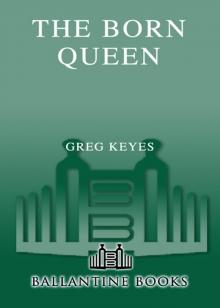 The Born Queen
The Born Queen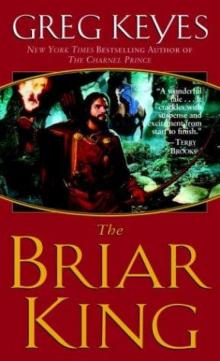 The Briar King
The Briar King Star Wars The New Jedi Order - Dark Journey - Book 10
Star Wars The New Jedi Order - Dark Journey - Book 10 Star Wars: New Jedi Order Book 8b: Emissary of the Void
Star Wars: New Jedi Order Book 8b: Emissary of the Void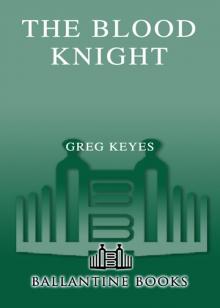 The Blood Knight
The Blood Knight Star Wars - Edge of Victory - Book 1: Conquest
Star Wars - Edge of Victory - Book 1: Conquest Edge of Victory 2 Rebirth
Edge of Victory 2 Rebirth Lord of Souls: An Elder Scrolls Novel
Lord of Souls: An Elder Scrolls Novel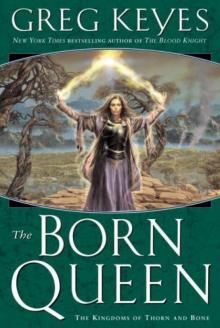 The Born Queen tkotab-4
The Born Queen tkotab-4 Rebirth: Edge of Victory II
Rebirth: Edge of Victory II Conquest: Edge of Victory I
Conquest: Edge of Victory I Emissary of the Void
Emissary of the Void The Blackgod
The Blackgod Star Wars The New Jedi Order - The Final Prophecy - Book 19
Star Wars The New Jedi Order - The Final Prophecy - Book 19 The Infernal City
The Infernal City The Charnel Prince
The Charnel Prince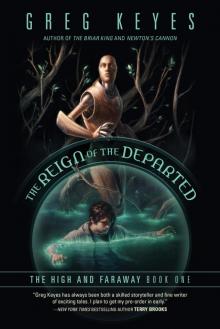 The Reign of the Departed
The Reign of the Departed Lord of Souls es-2
Lord of Souls es-2 Chosen of the Changeling
Chosen of the Changeling Dawn of the Planet of the Apes
Dawn of the Planet of the Apes Footsteps in the Sky
Footsteps in the Sky PACIFIC RIM UPRISING ASCENSION
PACIFIC RIM UPRISING ASCENSION The Final Prophecy: Edge of Victory III
The Final Prophecy: Edge of Victory III